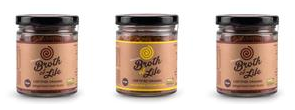
Born around 460BC, Hippocrates was from Kos in Greece. Regarded as the greatest physician of his time, he is often referred to as the Father of Modern Medicine. [1] He was the first person to remove the link between religious superstition and medicine. He achieved this by establishing medicine as a science based on observation.
Hippocrates also developed an understanding of how health is often influenced by the environment, by diet and by the failure of bodily functions.
In short, he was a very smart man who knew his stuff and was ahead of his time.
In addition to the all this, Hippocrates once said that "all disease begins in the gut." While, ALL might not be entirely accurate, he was certainly onto something and managed to pave the way of understanding for those of us who suffer from gut issues. So, high fives, Hippocrates. We owe you one!
The gut and our "second brain," as it also commonly known, can be the starting point for so many problems. Treat it badly and it will do the same right back to you - oh, but treat it well? And it's the kind of friend who'll make you feel like a million bucks every-single-day. The kind of friend you want in your corner.
The frustrating thing is that people with gut problems often go undiagnosed or misdiagnosed. They might be living with what they think is a normal digestive system. They could be tired and just blame that fatigue on being overworked. They might have skin issues and think it's due to their genetics. There are a number of symptoms that suggest your gut or digestive tract is not functioning to the best of its ability. Some of these symptoms include;
- Constipation
- Bloating
- Excess intestinal gas
- Chronic diarrhea
- Acid reflux
- Throat and nose issues (E.g. clearing throat, runny nose)
- Chronic bad breath
- Inflammation
- Skin disorders
- Food allergies or negative reactions to food; To name just a few
If left untreated, poor digestion can lead to more long-term problems such as eczema, autoimmune disorders, meningitis, arthritis, mental illness and much, much more. And while Alexander Flemming's discovery of penicillin in 1928 was one the most ground-breaking contributions to modern medicine, it was also the beginning of an era of over diagnosis and over treatment.
Penicillin is used it fights bacteria. While this is a wonderful thing and great for curing a multitude of ailments, it attacks the good bacteria as well as the bad - and the gut is home to an abundance of good bacteria - trillions of organisms that make up ¾ of our immune system. When these microbes (good bacteria) are targeted, gut health is inevitably detrimentally affected. Again, causing the gut to not function properly. Overuse of antiobotics [2], chronic stress, toxic chemicals in our water, food, environment and poor diet are generally the cause of most gut problems.
The longer-term conditions such as increased gut permeability or leaky gut syndrome and irritable bowel syndrome have further negative impacts on the microbiome in the gut, which makes us even more vulnerable to an even longer list of diseases. It's sort of like kicking someone when they're down. Not cool. No matter which way you look at it.
While there are plenty of symptoms which indicate poor digestive health, it's important to understand that poor microbiome health can also be apparent without any symptoms or the affects can present themselves in other ways, in other parts of the body - through diseases you might have never thought to link to gut health. So, what do we do? Hippocrates, being the incredibly wise man that he was, would probably tell us to live the healthiest lifestyle we possibly can. Common sense, right? But so many of us don't do it. Maintaining a healthy weight, a balanced diet, avoiding overuse of things like penicillin and antibiotics where possible, exercising regularly, limiting alcohol consumption and feeding your gut with the good stuff like probiotics and bone broth is a great start.
Even if you already have healthy gut microbiome, a healthier lifestyle is always achievable. If our best form of defence against gut related ailments is to live well, how can we possibly argue?
To start the process of taking great care of your gut and feeling healthier than you ever have before, try our certified organic dehydrated bone broth today.
REFERENCES:
[1] Hell J Nucl Med. 2008 Jan-Apr;11(1):2-4.
Useful known and unknown views of the father of modern medicine, Hippocrates and his teacher Democritus.
Grammaticos PC, Diamantis A.
https://www.ncbi.nlm.nih.gov/pubmed/18392218
[2] Genome Med. 2016; 8: 39.
The effects of antibiotics on the microbiome throughout development and alternative approaches for therapeutic modulation
Amy Langdon,# Nathan Crook,# and Gautam Dantas
https://www.ncbi.nlm.nih.gov/pmc/articles/PMC4831151/
http://www.huffingtonpost.com/entry/all-disease-begins-in-the-gut-hippocrates_us_58f9ed4ee4b086ce58980fc3
http://themindunleashed.com/2015/03/hippocrates-all-disease-begins-in-the-gut.html
http://www.healthline.com/nutrition/does-all-disease-begin-in-the-gut
https://www.mindbodygreen.com/0-17191/11-health-problems-that-can-start-in-your-gut.html
https://www.mindbodygreen.com/0-14368/live-dirty-eat-clean-why-the-microbiome-is-the-future-of-medicine-dr-robynne.html
https://www.drdavidwilliams.com/signs-of-too-much-bad-gut-bacteria

